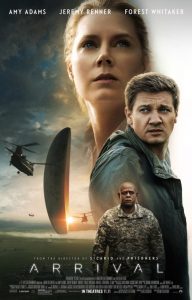Movie Review: Arrival
 Arrival does not fall in the genre of sci-fi movies that assault your nerves with grisly human-vs-alien encounters, using heavy artillery that will blow the latter to kingdom come. This sci-fi is more of a thinking enthusiast’s film. Adapted from Ted Chaing’s novella, `Story of Your Life,’ the storyline is high-concept, but not a head-scratcher like Interstellar. It is more in the line of Contact based on Carl Sagan’s novel of the same name, or Steven Spielberg’s Close Encounters of the Third Kind.
Arrival does not fall in the genre of sci-fi movies that assault your nerves with grisly human-vs-alien encounters, using heavy artillery that will blow the latter to kingdom come. This sci-fi is more of a thinking enthusiast’s film. Adapted from Ted Chaing’s novella, `Story of Your Life,’ the storyline is high-concept, but not a head-scratcher like Interstellar. It is more in the line of Contact based on Carl Sagan’s novel of the same name, or Steven Spielberg’s Close Encounters of the Third Kind.
A world-renowned professor of comparative linguistics, Dr Louise Banks, (Amy Adams), is the unlikely protagonist, who lives alone near her lake-side home, nurturing the deep sorrow of losing her only child — a teenage daughter to cancer. The unexpected arrival of alien spaceships at 12 locations around the world, including of all places, Pakistan, suddenly puts her life in high gear. As the news spreads around the world so does panic, with the questions, “Why are they here? Where did they come from?” looming large. Every kind of explanation is explored on the choice of locations but experts find no logic to it.
The US army point persons, led by Colonel Weber (Forest Whitaker), turn up at Banks’ doorstep, asking her to translate linguistic sounds emanating from the aliens, apparently in their attempt to communicate. She is whisked away by them and joined by Ian Donnelly (Jeremy Renner), a military theoretical physicist who believes that the cornerstone of any civilisation isn’t language — it’s science.
Di rector Villeneuve effectively engages the viewers through Banks’ eyes, building up the tension to the pre-eminent first contact, even as the world around her descends into paranoia. Of course she is also told that not everyone can process the experience in the same way when she spots a casualty being carried away on her arrival at a makeshift military base adjacent to the “shell” or sees a gigantic oblong monolith object anchored just above the ground in the green fields of Montana.
rector Villeneuve effectively engages the viewers through Banks’ eyes, building up the tension to the pre-eminent first contact, even as the world around her descends into paranoia. Of course she is also told that not everyone can process the experience in the same way when she spots a casualty being carried away on her arrival at a makeshift military base adjacent to the “shell” or sees a gigantic oblong monolith object anchored just above the ground in the green fields of Montana.
The director also compels the viewer to consider how pivotal language can be as a means of communication and co-operation — especially if there really was another intelligent life-form — and how easily miscommunication can escalate into a full-blown, unnecessary confrontation. Countries where the “shells” are located have an agreement on sharing scientific discoveries, but not one of them makes a breakthrough until Banks starts to interact with the “heptapods” — seven-appendaged creatures, with a sophisticated language that look like tea-cup stains. She even nicknames them Abbott and Costello. After cracking the code, the 12 countries share whatever they can decipher through their own experts in logogram, including the Pakistanis.
Apart from being nominated for Best Picture, Arrival has been selected for Oscars in the categories of cinematography, direction, film editing, production design, sound editing, sound mixing, and writing (adapted screenplay). What is surprising is that Amy Adams’ remarkable acting did not get an Oscar nod from the Academy, since the film really rests on her shoulders. The sci-fi plot would not have worked without the right dose of personal pain, unease and intelligence that Adams portrays in speaking on behalf of the human race. And without it, this would be a close encounter of the un-engaging kind.
The writer is working with the Newsline as Assistant Editor, she is a documentary filmmaker and activist.



